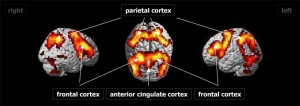 Those of you who have read my articles in the past already know how much significance I attribute to the benefits of exercise and nutrition on our mental well being. I am often being asked why I think we have so many children, and adults by the way, diagnosed with something we call ADHD, mood or anxiety disorders. Well, one day we may possibly find out that there is something particular in our food or environment that directly causes it. And for some children reducing simple sugars, gluten, or other additives can make a big difference. However, thinking about some friends of mine and how they absolutely do not function well when they do not keep up their rigorous aerobic workout routines made me consider something else; and remember my own childhood. Can you, our valued reader, think back of a time where we, especially our children, lived a sedentary lifestyle to the extent many actually do today? I can assure you that I was hardly ever chauffeured anywhere, nor did I enjoy being inside the house for longer than my mandatory homework. We ran and played outside every single minute we had. We drove our bicycles to school and back home under all weather conditions. And the same held true for soccer, football, and all other extracurricular activities. Let me ask you a different question: What does a dog do when you don’t walk it enough and keep it locked in the house for too long? You know the very few possible answers to this question. Now here comes some scientific evidence, which today we have in abundance. A study published in 2011 in the peer reviewed journal ‘Health Psychology’ by Davis et al. [1] came to the following conclusion:
Those of you who have read my articles in the past already know how much significance I attribute to the benefits of exercise and nutrition on our mental well being. I am often being asked why I think we have so many children, and adults by the way, diagnosed with something we call ADHD, mood or anxiety disorders. Well, one day we may possibly find out that there is something particular in our food or environment that directly causes it. And for some children reducing simple sugars, gluten, or other additives can make a big difference. However, thinking about some friends of mine and how they absolutely do not function well when they do not keep up their rigorous aerobic workout routines made me consider something else; and remember my own childhood. Can you, our valued reader, think back of a time where we, especially our children, lived a sedentary lifestyle to the extent many actually do today? I can assure you that I was hardly ever chauffeured anywhere, nor did I enjoy being inside the house for longer than my mandatory homework. We ran and played outside every single minute we had. We drove our bicycles to school and back home under all weather conditions. And the same held true for soccer, football, and all other extracurricular activities. Let me ask you a different question: What does a dog do when you don’t walk it enough and keep it locked in the house for too long? You know the very few possible answers to this question. Now here comes some scientific evidence, which today we have in abundance. A study published in 2011 in the peer reviewed journal ‘Health Psychology’ by Davis et al. [1] came to the following conclusion:
”Consistent with results obtained in older adults, a specific improvement on executive function and brain activation changes attributable to exercise were observed. The cognitive and achievement results add evidence of dose-response and extend experimental evidence into childhood. This study provides information on an educational outcome. Besides its importance for maintaining weight and reducing health risks during a childhood obesity epidemic, physical activity may prove to be a simple, important method of enhancing aspects of children’s mental functioning that are central to cognitive development. This information may persuade educators to implement vigorous physical activity.”
Particularly something called ‘executive function’ improves in children who follow a regular aerobically focused exercise routine. ‘Executive function’ includes cognitive processes predominantly associated with the frontal lobe of the brain, such as planning, working memory, attention and set shifting, problem solving, verbal reasoning, inhibition, mental flexibility, multi-tasking, and initiation and monitoring of actions. It is easy to understand why improvements in these functions lead to not only higher academic achievement, but to more socially acceptable behavior overall. As mentioned before the benefits of regular exercise and physical activity are not limited to executive functioning. They extend to other areas of the brain that seem to be affected in patients with mood and anxiety disorders. It appears that our brain metabolism has a tendency towards self-regulation given the right circumstances, a phenomenon called homeostasis in medicine.
(If you copy the following link into your browser you can find many more studies confirming these findings, approved by the US National Library of Medicine of the National Institutes of Health: http://www.ncbi.nlm.nih.gov/pubmed/21299297).
[1] Davis C., Tomporowski P., McDowell J., Austin B., Miller P., Yanasak N., Allison J., Naglieri J. (2011): Exercise improves executive function and achievement and alters brain activation in overweight children: a randomized, controlled trial. Health Psychology, 2011 Jan;30(1):91-8.
Comments
Powered by Facebook Comments

Connect with Us on These Sites